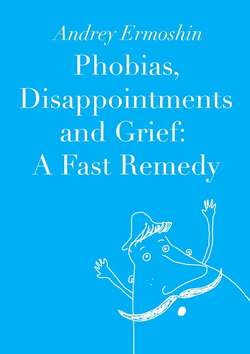Читать книгу Phobias, Disappointments and Grief: A Fast Remedy - Андрей Ермошин - Страница 7
Part 1. Work through Phobias and Panic Attacks
1.2. What is a phobia: general remarks
Risk factors
ОглавлениеThere are several important factors which affect the chances of a person developing a phobia.
1. Natural factor: the nature of a person. There are people who are naturally resistant to changes in their surroundings and those who feel at a loss even if there’s a slightest confusion in their life. Some people worry and are frightened even when the reason for it is insignificant. Their body type is in most cases elongated: a narrow face, a thin neck, comparatively long arms and legs. This constitution type ([битая ссылка] phenotype) is called asthenic or gracile.
People with fine skin and soft hair often worry too much about their family. These peculiarities are typical of so called “pyknic”, or sumptuous body type.
There is another phenotype that falls within the danger area. These people are inclined to day-dreaming and exaggerating reality. They have deep-set eyes, a narrow nose and a chiselled face: their body type is “bony” and lean.
2. The memory of generations. According to the ideas of some researchers (B. Hellinger, V. Dokuchaev, L. Dokuchaeva), the information from the precedent generations can be transmitted to their succession through the family spiritual field, through the “big soul” which all of us belong to. Sometimes my patients notice that the positive experience and support comes from “the roots” or “from the back”. But the memory of stressful situation which the ancestors had gone through can also be inherited. In this case a person experiences fears which cannot be explained by his or her own life or the contemporary situation.
3. Early childhood impressions. It often happens that the beginning of life creates a base for phobias and other traumas. Lack of experience and support, high levels of sensibility; there aren’t many people who managed to avoid “childhood fears”. In many cases they transform and become a part of the adult life. Some of the authors also pay special attention to pregnancy and childbearing periods (O. Rank, S. Grof).
4. Type of education. It’s quite important what kind world view was received from the patient’s family. It’s great if the overall spirit was that every problem could be solved: “there’s a chance in every crisis, I see the goal and I don’t see any obstacles.” But it’s a different story if the mood of panic was predominant in the family and if every trouble is seen as apocalyptic. It’s one thing when the child was taught to lead a healthy lifestyle and to wash hands before eating. However, it’s a totally different thing if there was a constant “fight with germs” and if they suggested the idea of people being helpless as if the immune system didn’t exist at all. Of course the risk of development of stable fears is much higher in the latter case.
4. General level of education and life competence. The more you know about life and ways of solving the problems, the calmer and more self-assured you are. The calmer you are, the more adequate your actions are. The more adequately you act, the more self-assurance you get. And vice versa, the less experienced you are, the more nervous you get and it’s more likely that you won’t accept the challenge.
5. Situations when it’s really difficult to adapt. There are extreme cases which even a very reasonable person can find difficult to maintain his or her cool. Unexpected situations may arise at the time when one simply has no experience dealing with and feels completely helpless. Such situations can happen at any stage in our life: from infant to elderly.
6. Whether one enjoys or lacks the support of other people or of society in general. An active team member can find it easier to overcome challenges than a lonely person. Keeping one’s cool is much easier when everything is calm rather than when the situation is critical. A state with a well-established social programme facilitates the resolution of various emergency situations unlike a society where every man is for himself.
